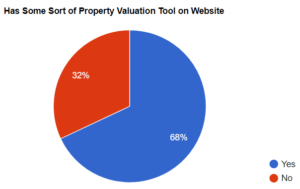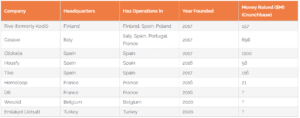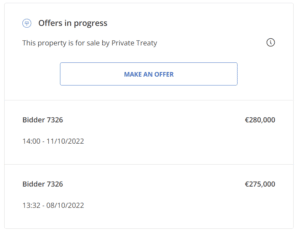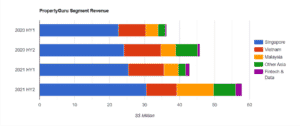
Online Marketplaces covered 88 property portal product updates in 2022, a slight decrease on 2021's 118. But which products and services launched in 2022 were the most interesting and important?
Here are some that caught our eye from the past 12 months...
For a year in which moving closer to the transaction was a key focus for portals worldwide, the simplicity of SmartVal is an excellent starting point... even if the company that launched it is now defunct.
Boomin went bust in 2022, but that doesn't mean all the UK challenger portal's ideas were destined for the scrap heap. SmartVal, built in partnership with UK customer insights and data agency TwentyCi, was launched in 2021—but it took Boomin until May 2022 to release figures about the tool's usage. They made for promising reading for agents looking to capture leads in the early stages of their property search.

Boomin claimed that over 20% of homeowners who received a SmartVal would go on to list their property with an agent (based on 300,000 SmartVal requests since launch).
As we found by deep-diving portal home valuation tools in a 2021 study, almost all (left) big property portals now have some kind of tool to make the most of homeowner curiosity and capture seller leads.
What made SmartVal different was that it was not only an algorithm reading some data. The tool invited users to put in their address and some supplementary information and then worked by sending that information to its network of agents who had 15 minutes to respond in person to the user.
After they received a valuation, the homeowner then had the option to list their property with one of the chosen agents.
Why did it work? Michael Bruce, CEO of the now-defunct Boomin, said at the time:
"Our tools, including SmartVal, create new business opportunities for agents and get them engaged with unique customers earlier in their property journey."
Casavo entered three international markets in one of Europe's most public expansion strategies this year.
Casavo is among Europe's largest iBuyers and the startup has raised around $700 million since its foundation in 2017. The company, which is backed by the powerful Agnelli family, is steadily growing its sphere of influence across Europe after expanding from Italy to Spain in 2020. The company continued its expansion in 2022 and has some big plans for its new markets...
Milan-based iBuyer Casavo launched its Portugal operation with gusto in January this year, with ambitious plans to buy up to €100m worth of real estate to cement its presence in a new market. The company then expanded to Seville in Spain in May, and entered the French market with the acquisition of Proprioo in October. CEO Giorgio Tinacci said Casavo's goal is to reach a "5% market share in France's biggest metropolitan areas" by 2025.

Irish portal Daft added online real-time offers to its platform this year, allowing buyers to place and track offers from anywhere and using any device.

The product is completely transparent, with all prospects able to see real-time information about ongoing bids.
Daft says it developed the product with estate agents to provide them with the ultimate tool in efficiency. Since launch, agents using Offers by Daft have reported that they have saved significantly on admin time, and they receive offers 24/7.
Offers by Daft also centralized the management of all offers (and individual bidders) into one central location.
Daft has reported that properties using the Offers product this year have received 7x as many views as those without.
At the time of writing, Daft has 76 listings with Online Offers activated.
Laura Barry, Marketing Manager at Daft, told us:
"We noticed that 40% of offers are placed outside working hours. Buyers are feeding back that they love this flexibility that they can place an offer in the evenings from the comfort of their couch.
Daft Offers means there's no need for buyers to call their agent for updates of other bidders—they get instant email notifications instead. This has made the buying process much more transparent, including when someone else makes a higher bid on the same property."
After advocating for portals to incorporate some sort of on-platform offer management (we know the technology exists), this was one product that we were very happy to see implemented on a leading portal.
REA Group was plenty ambitious in 2022, including the launch of a new marketplace that facilitates much faster moves for buyers and sellers.
Central to this was REA's introduction of the American 'Power Buying' concept—buy before you sell. The Australian portal giant partnered up with Bridgit and CampaignAgent to offer funding options up to AUD $4m and interest-free loans up to three months for buyers and vendors looking to seal a deal without depending on the chain.
Henry Ruiz, REA Group Chief Strategy Officer and CEO REAx, said:
"Researching property can be a fragmented experience and listings only tell part of a property’s story. With property.com.au we aim to help buyers and sellers achieve greater clarity on properties they might be interested in, which we know builds greater confidence to act.
"We have continued to evolve the site since introducing our refresh a few months ago. The launch of our new Marketplace is the next step in providing vendors with the confidence to list, and we’re pleased to have the support of the teams at Bridgit and CampaignAgent to deliver short-term financial solutions for both buyers and sellers."
Keep an eye on this one. Buy before you sell products are hot right now and will surely make their way to more markets in 2023.
Japanese tech has always been a bit special. Flying Homes, launched in July by Lifull, was no exception.
As the first virtual reality app to exist in the portal space, Lifull's Flying Homes-kun BETA lets users fly around digital twins of Japanese cities and virtually tour property listings based off accurate floor plan data.
Kohei Kawasaki, Executive Officer at LIFULL, said:
"The Flying Homes-kun project is for people who have difficulty finding a place to live due to physical and various physical restrictions such as distance and time.
"It all started with the idea that VR technology could be used to solve the problems we have. This time, we released it in the form of an Android application so that as many people as possible can experience a part of the result."
Lifull's AR/VR investments didn't end there. The company launched a second Augmented Reality app, Finding Serendipity, in December.
Zillow and CoStar are in a near-constant fight for dominance in the United States, and both portal companies upped the ante this year with their versions of "next gen" listings.
Zillow led the way with "Zillow Surfing 2.0" — including machine learning that generates floor plans and imports listing photos into them, giving shoppers an interactive 3D likeness of a property that accurately represented the unit's shape and flow. Zillow claimed that an hour of browsing the new listings would easily substitute a day's worth of in-person property viewings.
But don't accuse the portal of greed: the AI-generated floor plans are powered by Zillow tech, but were made available to use for free on listings anywhere.
According to data from the Zillow Consumer Housing Trends Report, 74% of buyers agree that a dynamic floorplan helps them determine if a home is right for them.
Additionally, 81% of buyers and 71% of renters said they were more likely to visit a home if the listing included a floorplan they liked.
Meanwhile, CoStar released their "Listings of the Future" a matter of days later (12, to be exact).
Listings of the Future offer an enhanced rental listing feature set clients can add onto their listings, including 3D tours and walkthrough videos, very similar to Zillow's offering.
It's the first of two major technological advancements the portals made this year. And the second focused on one city in particular...
Zillow and CoStar took their AR offerings to a new level this year. Once again, Zillow took the lead when Zillow-owned NYC specialist portal StreetEasy launched its Streetscape in May.
The Streetscape tool is available to users of StreetEasy's iOS app and lets users scan a street to reveal floating icons in front of residential buildings. Users can then click the icons to see more about the building and its amenities, discover listings available on StreetEasy, and view photos, floor plans, and virtual tours of the building’s units.
But Zillow's East Coast rival wasn't to be beaten, because just one month later...
CoStar's top-of-the-range portal CitySnap launched.
Promising “the most comprehensive and accurate residential real estate database in all of New York City”, CitySnap is built on up-to-the-minute real estate data from over 600 participating brokerage firms and 12,000 New York City member agents.
The launch showed off CoStar's long-term ambition for its listings—comprehensive, user-friendly, and based on real-time data.
We loved CitySnap's visual heavy approach, with no expense spared on including local transport links, price changes for the listing, agent details, interactive maps... and Sky Cam.

Who will win? Zillow or CoStar? Watch this space...
There's no news on what products and services will come out of this... but there will be a lot (and soon).
PropertyGuru launched PropertyGuru for Business, its new B2B arm, in December. CEO Hari V. Krishnan has already promised a suite of new features to match the Southeast Asia technology boom—but we won't see any until 2023 is underway.
PropertyGuru for Business includes a unified service and proprietary solutions such as DataSense, ValueNet, FastKey and a "marketing as a service" option.
It is the first Group in Asia to make this move, following similar launches by market leaders Zillow in the US and OnTheMarket in the UK.
The question is, how big will they go? PropertyGuru has a market-leading presence in four Asian countries, so any launches are likely to have a transformative effect on the Asian real estate market and, as the company will be hoping, on its performance.
